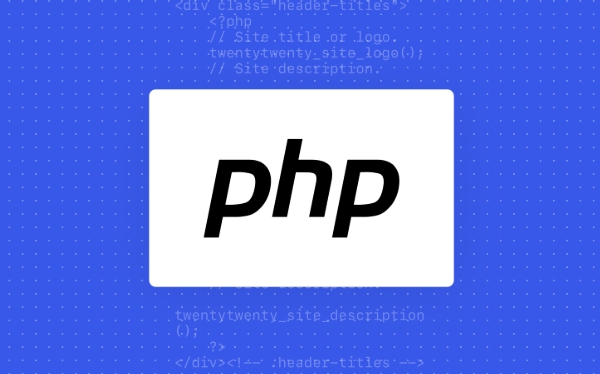 Backend Development
Backend Development
 PHP Tutorial
PHP Tutorial
 The Art of Extending PHP: A Deep Dive into PECL and Custom Extensions
The Art of Extending PHP: A Deep Dive into PECL and Custom Extensions
The Art of Extending PHP: A Deep Dive into PECL and Custom Extensions
Jul 26, 2025 am 09:48 AMPHP extension is a module written in C. It can expand PHP runtime functions, including exposing C libraries, adding new function classes, improving performance, and hooking the PHP life cycle; 2. PECL is a third-party extension repository of PHP, similar to Composer but used for C extensions, providing common extensions such as redis and swoole. It is installed through pecl install and needs to be enabled in php.ini; 3. Use PECL to pay attention to version compatibility, thread safety, maintenance status and security risks; 4. Custom extension steps: Install the php-dev toolchain, use phpize to generate skeletons, write config.m4 and C code, compile and install and load it into php.ini; 5. Extensions can implement functions, classes, types processing, and even intercept Zend engine events; 6. Extensions should be developed only when performance is critical and needs to be encapsulated by C library or system calls to avoid process crashes due to C code defects; 7. It is recommended to use high-level languages such as Zephir to replace pure C development for improved security; 8. Debugging tools include gdb, valgrind, and Zend macros to ensure that memory and reference counts are properly managed. In short, PHP extensions are powerful but complex, suitable for underlying needs that pure PHP cannot meet and need to be used with caution.

Extending PHP isn't just for core developers or open-source contributors — it's a powerful way to optimize performance, interface with low-level libraries, or add functionality not possible in pure PHP. While Composer and userland libraries handle most modern needs, there are times when you need to go deeper. That's where PECL and custom PHP extensions come in.

Let's break down how PHP extensions work, how PECL fits into the ecosystem, and what it takes to build your own.
What Are PHP Extensions and Why Use Them?
PHP extensions are modules written in C (sometimes with Zend Engine macros) that extend the PHP runtime. They can:

- Expose C libraries to PHP (eg,
redis,imagick) - Add new functions, classes, or interfaces
- Improve performance by moving hot code paths to C
- Hook into PHP's lifecycle (startup, shutdown, request handling)
Unlike regular PHP code, extensions run in the same process as PHP itself, giving them direct access to memory, the Zend Engine, and internal data structures — which means both power and risk .
There are two main ways to get extensions:

- Official PHP extensions (bundled or enabled at compile time)
- PECL extensions (third-party, community-maintained)
- Custom extensions (built in-house for specific needs)
PECL: The Extension Repository for PHP
PECL (PHP Extension Community Library) is like Composer for C extensions. It hosts dozens of ready-to-install extensions, many of which wrap popular C libraries.
Common PECL Extensions
-
redis/memcached– High-performance clients -
igbinary– Binary serialization -
swoole– Async concurrency and coroutines -
grpc– gRPC support -
ds– Data structures (faster than PHP arrays for some use cases)
Installing a PECL Extension
pecl install redis
This compiles the extension and places the .so file in your PHP extension directory. Then, you enable it in php.ini :
extension=redis.so
?? Note: PECL extensions often require development headers (
php-dev,php-devel) and a C compiler. They're not as portable as Composer packages.
Caveats with PECL
- Version conflicts : Some extensions lag behind PHP versions.
- Thread safety : Critical in Apache mod_php setups.
- Maintenance : Not all PECL packages are actively maintained.
- Security : You're running C code with full access to PHP's internals.
Always check the extension's GitHub/GitLab repo and release history before deploying.
Building a Custom PHP Extension: The Basics
Sometimes, no existing extension does what you need. Maybe you want to:
- Wrap a proprietary C library
- Optimize a critical algorithm (eg, math, parsing)
- Interface with hardware or system calls
That's when you write your own.
Step 1: Set Up the Environment
You'll need:
- PHP development headers (
sudo apt install php-devon Debian/Ubuntu) -
phpize(comes with php-dev) – prepares the build environment - AC compiler (
gcc,clang) - Basic knowledge of C and the Zend API
Step 2: Generate the Skeleton
Use phpize to bootstrap:
mkdir myext cd myext phpize
This generates build scripts and configuration files.
Create a basic config.m4 (autoconf file):
PHP_ARG_ENABLE(myext, whether to enable myext support, [ --enable-myext Enable myext support]) if test "$PHP_MYEXT" != "no"; then AC_DEFINE(HAVE_MYEXT, 1, [Whether you have myext]) PHP_NEW_EXTENSION(myext, myext.c, $ext_shared) fi
Then write myext.c — the main extension file.
Step 3: Write the Extension Code
Here's a minimum example that adds a function hello() :
#include "php.h"
// Function signature
PHP_FUNCTION(hello);
// Define the function entry
const zend_function_entry myext_functions[] = {
PHP_FE(hello, NULL)
PHP_FE_END
};
// Module entry
zend_module_entry myext_module_entry = {
STANDARD_MODULE_HEADER,
"myext",
myext_functions,
NULL, NULL, NULL, NULL, NULL,
"0.1.0",
STANDARD_MODULE_PROPERTIES
};
// Required for shared modules
ZEND_GET_MODULE(myext)
// Implementation of hello()
PHP_FUNCTION(hello)
{
RETURN_STRING("Hello from C!");
}Step 4: Compile and Install
./configure --enable-myext Make sudo make install
Then add to php.ini :
extension=myext.so
Now run:
<?php echo hello(); // Outputs: Hello from C!
Advanced: Exposing Classes and Handling Types
You can do much more than functions. For example, define a class in C:
// In myext.c
zend_class_entry *myext_ce;
PHP_METHOD(MyClass, __construct) {
zend_string *name;
if (zend_parse_parameters(ZEND_NUM_ARGS(), "S", &name) == FAILURE) {
RETURN_THROWS();
}
zend_update_property_stringl(zend_ce, getThis(), "name", 4, ZSTR_VAL(name), ZSTR_LEN(name));
}
// Register class
myext_ce = register_class_MyClass();You can also work with arrays, objects, resources, and even intercept engine events using Zend hooks .
When Should You Write a Custom Extension?
Don't rush into C. Consider:
? Good reasons :
- Performance-critical math/string/parsing
- Wrapping a C/C library (eg, TensorFlow, FFmpeg)
- Low-level system access (eg, sockets, signals)
- Profiling or monitoring tools
? Bad reasons :
- "It'll be faster" without profiling
- Avoiding autoloading or Composer
- Just because you can
Remember: A bug in a C extension can crash the entire PHP process. Debugging requires gdb , valgrind , or Zend Debugger .
Tools and Debugging Tips
- ZTS (Zend Thread Safety) : Use if running in threaded SAPIs (eg, Apache worker)
- valgrind : Detect memory leaks
- gdb : Debug segfaults
- Zend macros : Use
ZVAL_*,RETURN_*macros carefully — they manage refcounting - phpize --clean : Clean build artifacts
Also, consider using Zephir — a high-level language that compiles to C extensions, safer than raw C.
Building PHP extensions is not trivial, but it opens doors to performance and integration you can't get in userland. PECL gives you access to a rich ecosystem, while custom extensions let you push PHP beyond its usual limits.
Whether you're optimizing a bottleneck or wrapping a system library, understanding how PHP extends itself is a valuable skill — especially when pure PHP isn't enough.
Basically, it's low-level, powerful, and not for everyday use — but when you need it, nothing else works.
The above is the detailed content of The Art of Extending PHP: A Deep Dive into PECL and Custom Extensions. For more information, please follow other related articles on the PHP Chinese website!

Hot AI Tools

Undress AI Tool
Undress images for free

Undresser.AI Undress
AI-powered app for creating realistic nude photos

AI Clothes Remover
Online AI tool for removing clothes from photos.

Clothoff.io
AI clothes remover

Video Face Swap
Swap faces in any video effortlessly with our completely free AI face swap tool!

Hot Article

Hot Tools

Notepad++7.3.1
Easy-to-use and free code editor

SublimeText3 Chinese version
Chinese version, very easy to use

Zend Studio 13.0.1
Powerful PHP integrated development environment

Dreamweaver CS6
Visual web development tools

SublimeText3 Mac version
God-level code editing software (SublimeText3)
 Mastering PHP-FPM and Nginx: A High-Performance Setup Guide
Jul 25, 2025 am 05:48 AM
Mastering PHP-FPM and Nginx: A High-Performance Setup Guide
Jul 25, 2025 am 05:48 AM
NginxhandlesstaticfilesandroutesdynamicrequeststoPHP-FPM,whichprocessesPHPscriptsviaFastCGI;2.OptimizePHP-FPMbyusingUnixsockets,settingpm=dynamicwithappropriatemax_children,spareservers,andmax_requeststobalanceperformanceandmemory;3.ConfigureNginxwit
 Harnessing the Power of WSL 2 for a Linux-Native PHP Development Workflow
Jul 26, 2025 am 09:40 AM
Harnessing the Power of WSL 2 for a Linux-Native PHP Development Workflow
Jul 26, 2025 am 09:40 AM
WSL2isthenewstandardforseriousPHPdevelopmentonWindows.1.InstallWSL2withUbuntuusingwsl--install,thenupdatewithsudoaptupdate&&sudoaptupgrade-y,keepingprojectsintheLinuxfilesystemforoptimalperformance.2.InstallPHP8.3andComposerviaOnd?ejSury’sPPA
 Setting Up PHP on macOS
Jul 17, 2025 am 04:15 AM
Setting Up PHP on macOS
Jul 17, 2025 am 04:15 AM
It is recommended to use Homebrew to install PHP, run /bin/bash-c"$(curl-fsSLhttps://raw.githubusercontent.com/Homebrew/install/HEAD/install.sh)" to install Homebrew, and then execute brewinstallphp or a specified version such as brewinstallphp@8.1; after installation, edit the php.ini file in the corresponding path to adjust memory_limit, upload_max_filesize, post_max_size and display_
 Demystifying PHP Compilation: Building a Custom PHP from Source for Optimal Performance
Jul 25, 2025 am 06:59 AM
Demystifying PHP Compilation: Building a Custom PHP from Source for Optimal Performance
Jul 25, 2025 am 06:59 AM
CompilingPHPfromsourceisnotnecessaryformostprojectsbutprovidesfullcontrolforpeakperformance,minimalbloat,andspecificoptimizations.2.ItinvolvesconvertingPHP’sCsourcecodeintoexecutables,allowingcustomizationlikestrippingunusedextensions,enablingCPU-spe
 Deploying a Scalable PHP Environment on AWS EC2 from Scratch
Jul 26, 2025 am 09:52 AM
Deploying a Scalable PHP Environment on AWS EC2 from Scratch
Jul 26, 2025 am 09:52 AM
LaunchanEC2instancewithAmazonLinux,appropriateinstancetype,securesecuritygroup,andkeypair.2.InstallLAMPstackbyupdatingpackages,installingApache,MariaDB,PHP,startingservices,securingMySQL,andtestingPHP.3.DecouplecomponentsbymovingdatabasetoRDS,storing
 Unlocking Peak PHP Performance: Configuring OPcache and JIT Compilation
Jul 24, 2025 pm 09:58 PM
Unlocking Peak PHP Performance: Configuring OPcache and JIT Compilation
Jul 24, 2025 pm 09:58 PM
OPcache and JIT are the core tools for PHP8.0 performance optimization. Correct configuration can significantly improve execution efficiency; 1. Enable OPcache and set opcache.enable=1, opcache.memory_consumption=192, opcache.max_accelerated_files=20000, opcache.validate_timestamps=0 to implement opcode caching and reduce parsing overhead; 2. Configure JIT to enable tracking JIT through opcache.jit_buffer_size=256M and opcache.jit=1254
 Automating Your PHP Environment Setup: Integrating PHP into a CI/CD Pipeline
Jul 26, 2025 am 09:53 AM
Automating Your PHP Environment Setup: Integrating PHP into a CI/CD Pipeline
Jul 26, 2025 am 09:53 AM
ChooseaCI/CDplatformlikeGitHubActionsorGitLabCIfortightversioncontrolintegrationandminimalinfrastructure;2.DefineaconsistentPHPenvironmentusingcontainerizationwithimageslikephp:8.2-cliorcomposer:latestandinstalldependenciesviacomposerinstall--no-inte
 Troubleshooting Common PHP Installation Pitfalls: A Diagnostic Checklist
Jul 26, 2025 am 09:50 AM
Troubleshooting Common PHP Installation Pitfalls: A Diagnostic Checklist
Jul 26, 2025 am 09:50 AM
VerifysystemrequirementsanddependenciesbyconfirmingOScompatibilityandinstallingessentiallibrariesandbuildtools,usingpackagemanagerslikeaptoryumtosimplifydependencymanagement.2.CheckPHPconfigurationandcompilationerrorsbyrunningaminimal./configurecomma





